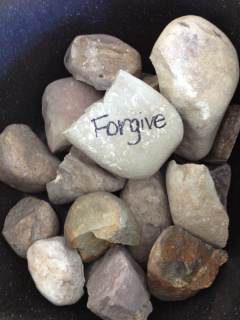
It’s kind of freaky for a preacher if you
have to juxtapose Mother’s Day with a Sunday when the lectionary features the
brutal murder of the first Christian martyr. St. Stephen is the featured
protagonist of our first lectionary reading (Acts 7: 55-60), and we get to see
him meet his end at the hands of an angry mob who kill him by pelting him with
rocks. It’s not exactly a sweet Hallmark card Mother’s Day sentiment. Granted, there
are probably a lot of mothers who have been—or who at least see themselves—as martyrs, and who
willingly pass the sentiment along to their children in never-ending
recitations of their parental drudgery and their offspring’s ingratitude. (There might even be a few moms who get stoned
from time to time, but we’re not going to go
there.)
If you think about it, the lectionary
actually fits pretty niftily into the theme of our secular holiday. Why is that,
you ask? Because in Greek the word “martyr” actually means “witness.” It didn’t
start out meaning someone who died for their faith (although getting killed for
what you believe in is, you must admit, a pretty darn strong testimony!);
rather, it simply referred to someone who was willing to speak of what they
knew to be true. When I asked the students in the Diakonia class I’m teaching to
name the person who most influenced them in their Christian faith, they almost unanimously
answered, “My mom.”
Moms are powerful “martyrs” in this
respect. My own mom was a brilliantly creative artist and designer. She was also,
alas, prone to being hyper-critical, a borderline hoarder, and a world-class
cigarette smoker which accounted for her demise from COPD. But her
short-comings notwithstanding, my mother was determined to raise her children
in the Christian faith –specifically as Lutherans. In fact, much of the
information covered by my Reformation History professor when I was in seminary
I had already learned from my mom. She and I may not have agreed on politics or
popular culture, but she gave me the gift of my faith tradition and for that I will
always be grateful.
When we take a look at the First Lesson in
the Revised Common Lectionary for Easter 5 Year A, I think it’s important that
we read back a chapter and see that the most important witness we get from this guy Stephen is not how he died but how he lived. The Bible says Stephen was “full
of faith and the Holy Spirit (Acts 6:5)” as well as being “full of grace and
power (6:8).” I’m guessing this means Stephen was a strong believer in Christ,
had a great relationship with God, was open-minded, thankful, and pretty
competent in his work. He was also really well-versed in Jewish history and
literature, astonishingly courageous in the face of death, and openly forgiving
as we see in chapter 7. All of these traits are witnesses to his faith in Christ
and to the Spirit which dwelt within him.
The Gospel Lesson this Sunday is one which
I preach on more than any other. John 14:1-6 is a recommended text for funerals
and memorial services, probably because of the promise that we will one day be
with Christ (14:3). I’ve got to confess to being a bit uneasy with this text as
I think the Biblical inerrancy folks have always interpreted verse 6 to mean “We
Christians go to Heaven when we die and all the rest of you are screwed.” I
wouldn’t presume to put myself in the place of God and judge his children based
on whether or not they assent to the same doctrine I do. I’m much more
comfortable interpreting this as saying that the “way” of Christ is a way of
oneness and peace with God. What I like about the story is that Jesus is
certain that his buddies “know the way (14:4).” Poor Thomas is a little
confused, thinking that Jesus is referring to some geographic location, but
Jesus sets him straight. To be in relationship with Jesus is to be in
relationship with the way of God and the peace which flows from that path of
living. The disciples “know the way” because they know Jesus.
So what is this “way?” Certainly it has a
lot to do with love, sacrifice, gratitude, willingness to suffer, and faith in
the God who raised Jesus from the dead. I’m willing to bet that if you learned
this “way,” it might well have been because of the witness of your mother. She
was the “martyr” who spoke the language of Christ to you.
We are all called to “martyrdom.” That is,
we are all called to be witnesses. It’s good to reflect, as I often say, on how
we see Christ in others, but we are also called to be Christ to others. Pope Benedict XVI had a cool way of
expressing this:
Life
in its true sense is not something we have exclusively in or from ourselves; it
is a relationship. And life in its totality is a relationship with Him who is
the source of life. If we are in relation with Him who does not die, who is
Life itself and Love itself, then we are in life. Then we “live.” (From “Saved in
Hope”)
A Happy Mother’s Day to you all.
No comments:
Post a Comment